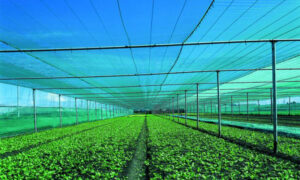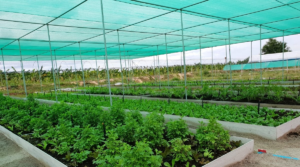Embracing Sustainable Agriculture with Shade Net Solutions
In the vast expanse of South Africa’s agricultural realm, where innovation meets tradition, a humble yet effective approach to cultivation is gaining prominence—shade net farming. As an alternative to high-tech greenhouses, shade net structures offer a low to mid-tech solution, harnessing the natural benefits of shade to foster optimal growing conditions for a diverse range of crops.

Unveiling the Essence of Shade Net Farming
Shade net farming epitomizes simplicity in design and effectiveness in function. Crafted from durable polyethylene fabric, these structures serve as a protective canopy, filtering sunlight and moderating environmental conditions to nurture thriving crops. Unlike their high-tech counterparts, shade net farms embrace a more minimalist approach, relying on nature’s elements to drive agricultural productivity.
Leveraging the Benefits of Low-Tech Innovation
While high-tech greenhouses boast advanced automation and precise climate control systems, shade net farming offers a more accessible and cost-effective alternative. By harnessing the natural filtering properties of shade netting, farmers can regulate temperature, reduce water consumption, and mitigate the impact of harsh weather conditions—all without the need for complex machinery or expensive infrastructure.
Maximizing Crop Yield with Minimal Environmental Impact
In an era where sustainability is paramount, shade net farming emerges as a beacon of eco-friendly agriculture. By minimizing energy consumption and greenhouse gas emissions associated with high-tech greenhouse operations, shade net farms exemplify a low-carbon approach to food production. Moreover, the use of shade netting helps conserve water resources, promoting responsible stewardship of our natural environment.
From Citrus Groves to Vegetable Gardens: Applications Across South Africa
Across the diverse landscapes of South Africa’s nine provinces, shade net farming finds versatile applications in a myriad of agricultural settings:
Eastern Cape: Protecting Citrus Orchards from Sunburn
In the sun-drenched orchards of the Eastern Cape, where citrus reigns supreme, shade net farming offers vital protection against sunburn and heat stress. By providing a shaded sanctuary for delicate fruit, these low-tech structures ensure optimal growing conditions and sustainably enhance citrus yields.

Western Cape: Nurturing Vineyards Amidst Coastal Breezes
Along the picturesque vineyards of the Western Cape, where cool coastal breezes temper the summer heat, shade net farming emerges as a pragmatic solution for grape growers. By sheltering vineyards from excessive sunlight and wind exposure, these simple yet effective structures promote even ripening and elevate wine grape quality.
Free State: Sustaining Maize Fields Amidst Arid Plains
In the sun-parched landscapes of the Free State, where maize fields stretch to the horizon, shade net farming offers a lifeline for farmers facing water scarcity and intense heat. By reducing evaporation and minimizing temperature extremes, these low-tech solutions bolster vegetable resilience and support sustainable agricultural practices.
Mpumalanga: Enhancing Avocado Orchards in Subtropical Climes
Amidst the lush orchards of Mpumalanga, where avocados thrive in subtropical climes, shade net farming serves as a guardian against scorching temperatures and sunburn. By providing a shaded microclimate for avocado trees, these simple structures foster healthy growth and sustainably optimize fruit production.
Gauteng: Cultivating Nutrient-Rich Vegetables in Urban Environments
In the bustling urban landscapes of Gauteng, where space is at a premium, shade net farming offers a scalable solution for cultivating nutrient-rich vegetables. From rooftop gardens to community plots, these low-tech structures empower urban dwellers to reconnect with nature and access fresh, locally grown produce.

Embracing the Future of Sustainable Agriculture
As the agricultural landscape evolves and climate change poses new challenges, the adoption of shade net farming represents a paradigm shift towards sustainable, resilient food production. By harnessing the inherent benefits of shade net structures, farmers across South Africa are embracing a low to mid-tech alternative to high-tech greenhouses, unlocking the potential for bountiful harvests while minimizing environmental impact.
Conclusion: Nurturing Growth Under Nature’s Canopy
In the tapestry of South Africa’s agricultural heritage, shade net farming emerges as a testament to ingenuity and adaptability. By harnessing the power of shade to nurture growth and enhance crop resilience, farmers are redefining the boundaries of traditional agriculture and embracing a more sustainable future. As shade net farming continues to proliferate across the nation, it serves as a symbol of hope and resilience, fostering a legacy of stewardship and abundance for generations to come.

